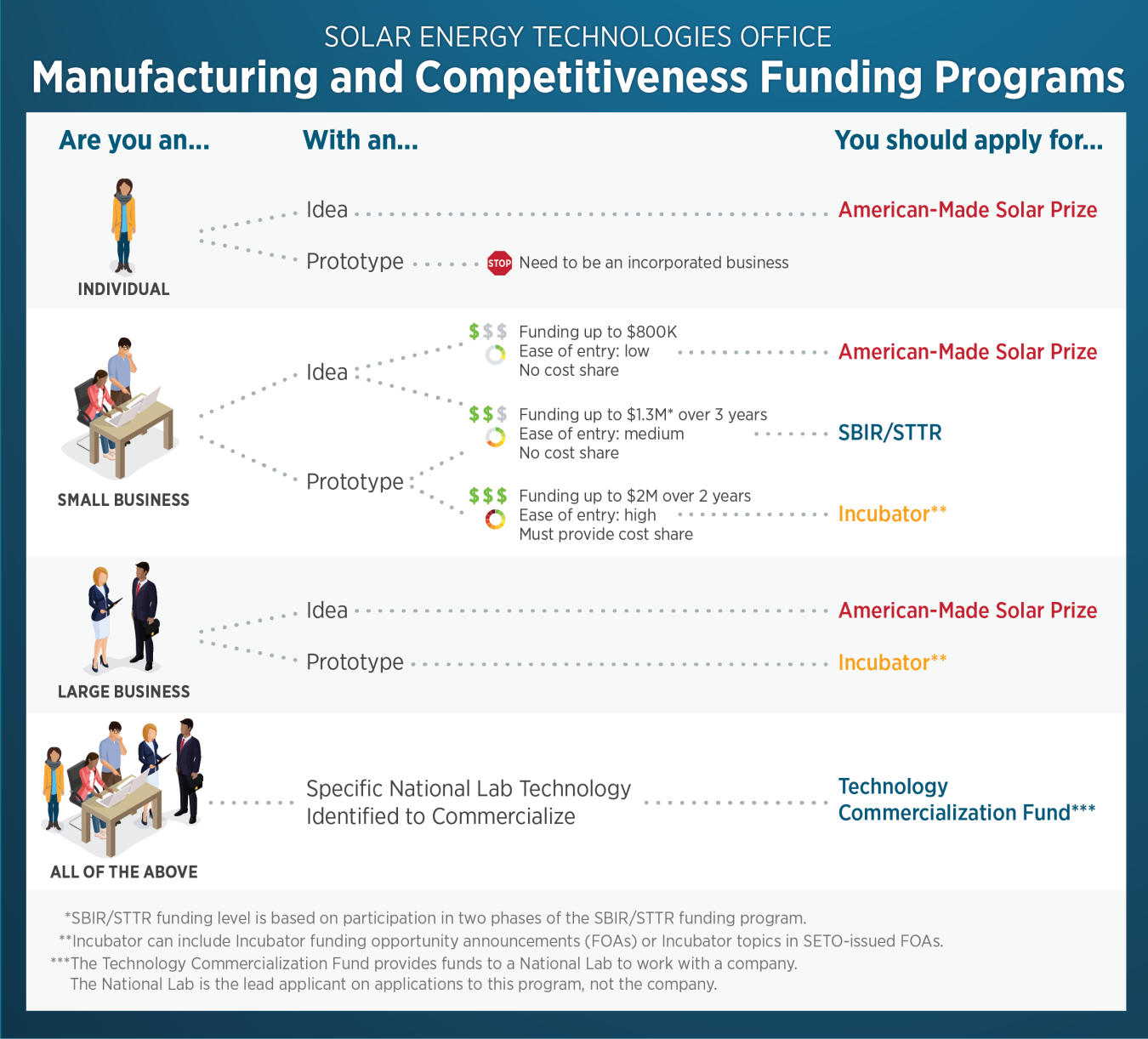What is Solar Business Support?
To spur American innovation and increase domestic solar manufacturing, the U.S. Department of Energy (DOE) Solar Energy Technologies Office (SETO) supports entrepreneurs and small businesses in their efforts to develop and advance solar technologies. Early-stage assistance helps startup companies cross technological barriers to commercialization and ultimately helps promising solar products to reach the market. Learn more about how solar technologies work.
Why is Solar Business Support Important?
Bringing new technologies from conceptualization to the prototype stage, and then into the market is challenging, especially in the solar sector. Entrepreneurs developing new technologies or new solar manufacturing processes face high risks and have difficulties raising the funding needed to fully mature their ideas. Assisting these companies with their groundbreaking technologies helps SETO to reach its goals and supports American competitiveness. Learn more about SETO's goals.
SETO Research in Solar Business Support
Support is available through several different funding programs, through which awardees work with SETO to achieve project milestones. There are also entrepreneurship and partnership opportunities that provide technical assistance, industry expertise, and sometimes peer research and information sharing. The following is a list of mechanisms that support the goal of strengthening U.S solar manufacturing and competitiveness.
- The American-Made Solar Prize is a competition designed to support entrepreneurs as they develop transformative technology ideas into concepts and then into early-stage prototypes ready for industry testing. Competitors can receive up to $650,000 in cash prizes from a $3 million prize pool, as well as up to $150,000 in vouchers redeemable at the National Laboratories and other partner facilities. Learn more about SETO’s prizes and challenges.
- The Small Business Innovation Research and Small Business Technology Transfer (SBIR/STTR) programs provide awards to support research and development efforts at small businesses that have a specific scope of work and concrete objectives. There are two funding levels: feasibility study and proof-of-concept development (Phase I) and prototype development (Phase II).
- Incubator funding opportunity announcements (FOAs) or Incubator topics in DOE-issued FOAs are restricted to for-profit entities and focused on moving innovative ideas from the proof-of-concept stage to commercially relevant prototypes that will fulfill a market need. Projects generally last one to three years, and financial assistance is in the form of cooperative agreements, which involve substantial federal oversight, including rigorous “go/no go” technical and business milestones, to help ensure taxpayer value and return.
- The Technology Commercialization Fund promotes federal research and development investments in technologies with commercial potential, where DOE National Laboratories are the lead applicants. Each lab project requires a commercial, private-sector partner to commit a 50% project cost share and be involved in project formation and execution. The goal is to transfer the lab-developed technology to the commercial project partner.

To view specific projects that support small businesses, you can search the Solar Energy Research Database.
Additional Resources
- The DOE Office of Technology Transitions advances the economic, energy, and national security interests of the United States by expanding the commercial impact of DOE’s research and development portfolio. It streamlines access to information and to the National Labs and facilities, fostering partnerships that guide innovations from the lab into the marketplace.
Learn more about solar manufacturing and competitiveness research, other solar energy research in SETO, and current and former funding programs.

